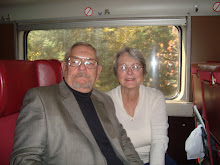After our tour of the Acropolis and Athens, we boarded our motor coach for a drive down a modern highway past Eleusis, enjoying views of the Saronic Gulf, to the Corinth Canal.
The Corinth Canal, like a deep gash in massive rock, is 76 feet wide and 26 feet deep and divides the narrow causeway linking the Peloponese with the mainland. Engineers of the 19th century succeeded where others had failed. The Emperor Nero once ordered a canal to be built here but was forced to abandon the project.
We stopped at a nice resort for a buffet lunch of Greek food and wine.
From there our drive to ancient ancient Corinth passed the dramatic Acrocorinth, the mammoth citadel that guarded the city. 
Ancient Corinth was once the wealthiest city in classical Greece. Famed also for its wicked ways, the city was introduced to Christianity by St. Paul.
This is the Temple of Apollo
This courtyard at the museum was full of headless statues. We found out that they were made that way and the head of the politician d’jour was place atop the statue.
This was a beautiful mosaic inside the museum. The museum contains mosaic floors, Mycenaean and Corinthian pottery, terra cotta sphinxes, statues of two supernatural beings, relief plaques, the Roman head of the Goddess Tyche and small objects of various kinds.
It is hard to believe that all of this draping is made of marble.
One of the sphinxes.
Looking towards the Lechaion, artificial harbor on the Corinthian Gulf, this 25 foot wide road was paved with flagstones and connected the port to the marketplace. It was lined with sidewalks, arcades and shops.
The marketplace.
This is the front of one of the shops that used to grace this wide street.
This is the Bema.
More ruins.
Wayne observed while driving back to the ship that all of the pull offs were full of trash. Not the cleanest of places to visit.





















No comments:
Post a Comment